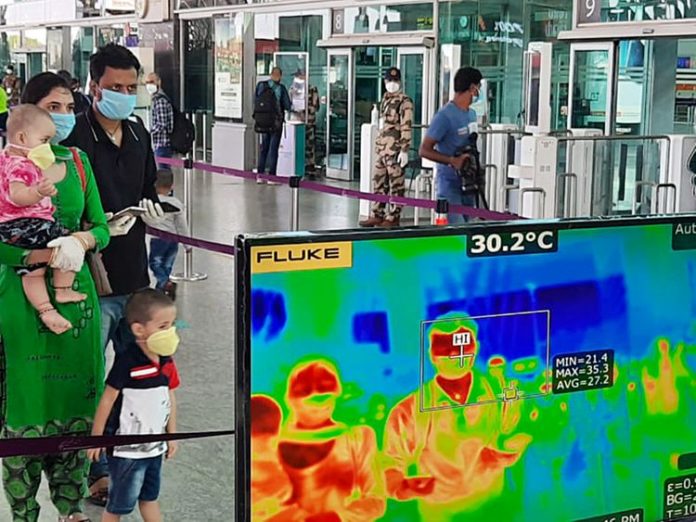HIGHLIGHTS
- Guidelines have been issued by Indian aviation and health authorities for all arrivals, with a specific set of guidelines for flights from the UK, Europe and Middle East. These include direct flights and transit flights.
- Mandatory COVID-19 RT-PCR test done 72 hours before departure. Another test needs to be done on arrival in India. This will be paid for by the passenger.
- Testing requirements are different for passengers from UK, Brazil and South Africa, and Ministry has asked airlines to alert passengers to expect a delay of six to eight hours if they are taking a connecting flight to another domestic airport (within India).
Dubai: If you are planning to travel to India from the UAE, or if you are going to arrive in India transitting through the UAE, there are new guidelines implemented by India’s health and aviation authorities that would need to be followed.
On February 17, India’s Ministry of Health and Family Welfare (MOHFW), issued detailed guidelines for international arrivals, which include procedures for those coming from the United Kingdom, Europe and Middle East, along with general guidelines for all other arrivals. The guidelines will come into effect from February 23.
So, if you are travelling from or transiting through the UAE, these are the steps you need to follow.
1. Fill in the Air Suvidha self-declaration form (SDF)
The form is available on www.newdelhiairport.in and should be submitted before the scheduled travel.
Passengers will be required to declare their travel history for the past 14 days.
While filling the SDF, apart from providing all other information required in the SDF, passengers need to select:
a. Whether they plan to disembark at the arrival airport or take further flights to reach their final destination in India.
b. Based on this selection, the receipt of SDF (dispatched online to the transiting travellers) will display ‘T’, for transit.
c. The passengers will need to display this receipt to State authority or government officials at the airport for segregation.
2. Keeping in mind that the testing requirements are different for passengers from UK, Brazil and South Africa, who have to take connecting flights, airlines should keep the passengers informed about the need for transit time of a minimum six to eight hours at the entry airport in India, while booking the tickets for connecting flights.
3. All the passengers arriving from United Kingdom, Europe and Middle East are required to carry a negative RT-PCR test (Reverse transcription polymerase chain reaction) report for which the test should have been conducted within 72 hours prior to starting the journey. The same also needs to be uploaded on the online portal (www.newdelhiairport.in).
4. Airlines have been asked to allow boarding only to those passengers who have filled in the SDF on the Air Suvidha portal and uploaded the negative RT-PCR test report.
5. The concerned airlines need to ensure that prior to check-in, the traveller is explained the new guidelines and operating procedures, particularly the need to get a molecular test done on arrival, which would be paid for by the passenger.
6. Airlines have also been asked to identify the international travellers arriving from/transiting through United Kingdom, Brazil and South Africa during the past 14 days and segregate them in-flight or while disembarking to facilitate the authorities to follow the due protocol in respect of these travellers.
On arrival
According to the guidelines issued, all the travellers arriving from or transiting through flights originating in United Kingdom, Europe or Middle East shall be mandatorily subjected to self-paid confirmatory molecular tests on arrival at the Indian airports concerned. Entry made in the SDF regarding telephone number and address would be reconfirmed by the airport authorities.
These are the procedures detailed by MOHFW for international arrival from flights originating in UK, Europe and Middle East. The procedure will vary depending on two factors:
1. Whether you are taking a connecting flight to a different airport and
2. If you were travelling from UK, Brazil or South Africa.
These are the procedures detailed by MOHFW for international arrival from flights originating in UK, Europe and Middle East. The procedure will vary depending on two factors:
1. Whether you are taking a connecting flight to a different airport and
2. If you were travelling from UK, Brazil or South Africa.
These are the procedures laid out by MOHFW:
1. Non-transiting passengers, travelling from Brazil, South Africa and UK
Give test sample at designated area and exit. If your test result is
a. Negative – Home quarantine for seven days, after which you will need to take a re-test. If your test result is still negative, you would need to continue to self-monitor your health for another seven days. Report to a medical facility if symptoms develop.
If your second test result is positive, you would be required to go into separate isolation and treatment. You will also be tested for the variant strain of COVID-19, through genomic sequencing.
If your test result is negative for the variant, you would need to follow treatment protocol for the circulating strain (SARS CoV-2).
If your test result is positive for the variant, you will continue the separate isolation and treatment and be discharged after a negative test report.
b. Positive – You would be required to go into separate isolation and treatment. You will also be tested for the variant strain of COVID-19, through genomic sequencing.
If your test result is negative for the variant, you would need to follow treatment protocol for the circulating strain (SARS CoV-2).
If your test result is positive for the variant, you will continue the separate isolation and treatment and be discharged after a negative test report.
2. Non-transiting passengers travelling from other countries
Give sample at designated area and exit the airport. If your test result is:
a. Negative – Self-monitor your health for 14 days. Report to a medical facility if symptoms develop.
b. Positive – Treatment as per health protocol.
3. Transiting passengers (with ‘T’ on the SDF) travelling from Brazil, South Africa or UK.
Give sample at designated area and take connecting flight only after confirmation of approved negative test report. If your test result is:
a. Negative – Home quarantine for seven days, after which you will need to take a re-test. If your test result is still negative, you would need to continue to self-monitor your health for another seven days. Report to a medical facility if symptoms develop.
If your second test result is positive, you would be required to go into separate isolation and treatment. You will also be tested for the variant strain of COVID-19, through genomic sequencing.
If your test result is negative for the variant, you would need to follow treatment protocol for the circulating strain (SARS CoV-2).
If your test result is positive for the variant, you will continue the separate isolation and treatment and be discharged after a negative test report.
b. Positive – You would be required to go into separate isolation and treatment. You will also be tested for the variant strain of COVID-19, through genomic sequencing.
If your test is negative for the variant, you would need to follow treatment protocol for the circulating strain (SARS CoV-2).
If your test result is positive for the variant, you will continue the separate isolation and treatment and be discharged after a negative test report.
4. Transiting passengers (with ‘T’ on the SDF) travelling from other countries.
Give sample at designated area and proceed for the connecting flight. If your test result is:
a. Negative – Self-monitor your health for 14 days. Report to a medical facility if symptoms develop.
b. Positive – Treatment as per health protocol.
Who is exempted from the new guidelines?
Those allowed exemption from pre-arrival mandatory RT-PCR testing are:
• Those travelling to India in the case of death in the family.
• Travellers would be required to apply online using the Air Suvidha portal (www.newdelhiairport.in) for exemption prior to their arrival and should have received an approval granting exemption.
They would then need to give samples at the designated area of the arrival airport and proceed home.
1. Self-monitor your health for 14 days. If symptoms develop, undergo testing.
If test result (either from the initial test at the airport or from a later test done due to symptoms developing) is …
a. Negative – Self-monitor health for seven days. Report to a medical facility if symptoms develop.
b. Positive – Treatment as per health protocol for all except those coming from Brazil, South Africa and UK, who shall follow the protocol prescribed earlier.
It is important to note that the guidelines from MOHFW are applied across India. However, each state may issue specific guidelines related to quarantine and testing. It is important to also check those guidelines, depending on your travel itinerary.




